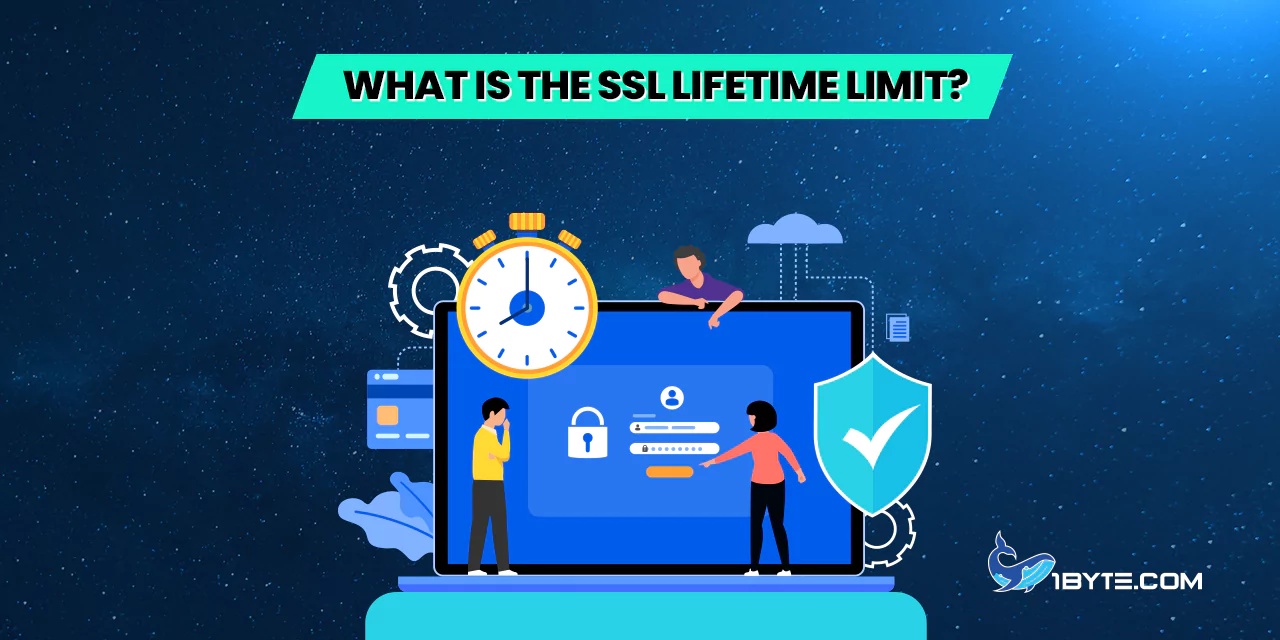ធ្វើដំណើរជាមួយយើង នៅពេលយើងស្វែងយល់ពីហេតុផលនៅពីក្រោយរយៈពេលវិញ្ញាបនបត្របន្ថែម និងផលប៉ះពាល់នៃដែនកំណត់អាយុកាលរបស់ SSL ។ ចាប់ពីការចេញដំបូងដល់សារៈសំខាន់នៃការចេញឡើងវិញ និងការចំណាយដែលពាក់ព័ន្ធ សូមចូលរួម XNUMXByte ក្នុងការរុករកផ្នែកសំខាន់ៗនៃមុខងារ SSL សម្រាប់បទពិសោធន៍អនឡាញដែលមានសុវត្ថិភាព។
មុខងារនៃវិញ្ញាបនបត្រ SSL រយៈពេល 2-5 ឆ្នាំ
ហេតុអ្វីបានជាអ្នកគួរពិចារណាវិញ្ញាបនបត្រលើសពីស្តង់ដាររយៈពេល 1 ឆ្នាំ? នៅ 1Byte យើងផ្តល់ជូននូវវិញ្ញាបនបត្រ SSL 2*, 3, 4 និង 5 ឆ្នាំ ដើម្បីផ្តល់ជូនអតិថិជនរបស់យើងនូវការធានាសុវត្ថិភាពដ៏ទូលំទូលាយ។ ការជ្រើសរើសរយៈពេលវែងមិនត្រឹមតែធានានូវការការពារគេហទំព័រយូរប៉ុណ្ណោះទេ ប៉ុន្តែថែមទាំងការពារអ្នកពីការប្រែប្រួលតម្លៃឧស្សាហកម្មដែលមានសក្តានុពលផងដែរ។
FURTHER READING: |
| 1. តើវិញ្ញាបនបត្រ SSL ជាអ្វី? អ្វីគ្រប់យ៉ាងដែលអ្នកត្រូវដឹង |
| 2. តើអាជ្ញាធរវិញ្ញាបនបត្រ (CA) ជាអ្វី? |
| 3. Domain Flipping Guide: គន្លឹះល្អបំផុតក្នុងការរកប្រាក់ចំណេញច្រើនបំផុតក្នុងឆ្នាំ 2025 |
ហេតុអ្វីបានជាខ្ញុំទទួលបានវិញ្ញាបនបត្រ SSL រយៈពេល 1 ឆ្នាំ ទោះបីជាការទិញជម្រើសច្រើនឆ្នាំក៏ដោយ?
នៅពេលអ្នកជ្រើសរើសវិញ្ញាបនបត្រ SSL ច្រើនឆ្នាំជាមួយយើងនៅ XNUMXByte វាចាំបាច់ណាស់ក្នុងការយល់ថាវិញ្ញាបនបត្រត្រូវបានចេញសម្រាប់មួយឆ្នាំក្នុងពេលតែមួយ។ ដើម្បីបង្កើនតម្លៃនៃការវិនិយោគ SSL របស់អ្នក អ្នកនឹងត្រូវឆ្លងកាត់ការចេញផ្សាយប្រចាំឆ្នាំ គ្រប់គ្រងយ៉ាងងាយស្រួលពីបន្ទះគណនីរបស់អ្នក។
ហេតុអ្វីបានជាការបន្តប្រចាំឆ្នាំនេះ? ឧស្សាហកម្ម SSL បានកំណត់ដែនកំណត់លើអាយុកាលនៃវិញ្ញាបនបត្រ SSL ដែលធ្វើឱ្យពួកគេមានសុពលភាពត្រឹមតែមួយឆ្នាំក្នុងមួយពេល។ នេះឆ្លុះបញ្ចាំងពីការប្តេជ្ញាចិត្តរបស់យើងក្នុងការរក្សាបាននូវស្តង់ដារសុវត្ថិភាពលំដាប់កំពូលនៅក្នុងទិដ្ឋភាពតាមអ៊ីនធឺណិតដែលកំពុងរីកចម្រើនយ៉ាងឆាប់រហ័ស។
តើដែនកំណត់អាយុកាលរបស់ SSL គឺជាអ្វី?
នៅ 1Byte យើងចង់កំណត់ដែនកំណត់អាយុកាល SSL ដែលជាទិដ្ឋភាពសំខាន់ដែលកំណត់ដោយកម្មវិធីរុករកបណ្ដាញធំៗដូចជា Safari, Chrome និង Firefox ។ ដែនកំណត់នេះ បង្ហាញពីអាយុកាលអតិបរមាដែលអនុញ្ញាតនៃវិញ្ញាបនបត្រ SSL ដែលកំណត់ត្រឹម 396 ថ្ងៃ ស្មើនឹងវិញ្ញាបនបត្រ 1 ឆ្នាំ។
ហេតុអ្វីបានជាបញ្ហានេះ? ដែនកំណត់អាយុកាល SSL ត្រូវបានកំណត់ដោយអ្នកដឹកនាំឧស្សាហកម្មដើម្បីបង្កើនស្តង់ដារសុវត្ថិភាព។ យើងយល់ពីសារៈសំខាន់នៃការរៀបចំ តាមតម្រូវការកម្មវិធីរុករកតាមអ៊ីនធឺណិតទាំងនេះ ដើម្បីធានាសុវត្ថិភាពលើអ៊ីនធឺណិតរបស់អ្នក។
ផលប៉ះពាល់លើវិញ្ញាបនបត្រពហុឆ្នាំរបស់អ្នក
នៅពេលអ្នកបើកដំណើរការវិញ្ញាបនបត្រពី 1Byte មិនថាវាសម្រាប់ 2, 3, 4 ឬ 5 ឆ្នាំទេ នេះគឺជាការយល់ដឹងដ៏សំខាន់មួយ៖ SSL ត្រូវបានចេញដំបូងសម្រាប់រយៈពេល 1 ឆ្នាំ។ វាជាទិដ្ឋភាពដ៏សំខាន់នៃការរុករកទិដ្ឋភាពដែនកំណត់អាយុកាលរបស់ SSL។
ដូច្នេះ តើនេះមានន័យយ៉ាងណាសម្រាប់អ្នក? បន្ទាប់ពីឆ្នាំដំបូង ដើម្បីបន្តទទួលបានអត្ថប្រយោជន៍ពីពេលវេលាដែលនៅសល់នៅលើវិញ្ញាបនបត្រពហុឆ្នាំរបស់អ្នក អ្នកត្រូវចេញ SSL ឡើងវិញ។ ដំណើរការត្រង់នេះធានាថាអ្នកបង្កើនការប្រើប្រាស់ SSL របស់អ្នកជាអតិបរមា ហើយស្ថិតនៅក្នុងដែនកំណត់នៃដែនកំណត់អាយុកាល SSL ។
តើការចេញវិញ្ញាបនបត្រ SSL គឺជាអ្វី?
ការធានាភាពជាប់បានយូរនៃគេហទំព័ររបស់អ្នកជាមួយនឹង SSL ច្រើនឆ្នាំពី 1Byte គឺជាការផ្លាស់ប្តូរយុទ្ធសាស្ត្រ។ ទោះជាយ៉ាងណាក៏ដោយ ការយល់ដឹងពីរបៀបធ្វើឱ្យអាយុជីវិតរបស់វាច្រើនបំផុត ពាក់ព័ន្ធនឹងការរុករកដំណើរការការចេញប័ណ្ណសារជាថ្មី ដែលជាជំហានសំខាន់មួយ នៅក្នុងក្របខ័ណ្ឌដែនកំណត់អាយុកាលរបស់ SSL ។
នៅពេលអ្នកចេញ SSL របស់អ្នកឡើងវិញតាមរយៈ 1Byte អាជ្ញាធរវិញ្ញាបនបត្របញ្ជូន SSL មួយផ្សេងទៀត ជាធម្មតាសម្រាប់រយៈពេលមួយឆ្នាំ ឬតិចជាងនេះ អាស្រ័យលើសុពលភាពដែលនៅសល់នៃវិញ្ញាបនបត្ររបស់អ្នក។ នេះធានាថាគេហទំព័ររបស់អ្នកនៅតែត្រូវបានការពារជាប់លាប់ពេញមួយការធ្វើដំណើរ SSL ច្រើនឆ្នាំរបស់វា។
ដើម្បីដំណើរការការចេញឡើងវិញដោយគ្មានថ្នេរ សូមទៅកាន់ទំព័រព័ត៌មានលម្អិត SSL នៅក្នុងបន្ទះគណនី 1Byte របស់អ្នក។ ដំណើរការនេះឆ្លុះបញ្ចាំងពីភាពសាមញ្ញនៃការទិញ និងការធ្វើឱ្យសកម្ម SSL ដំបូងរបស់អ្នក ដោយផ្តល់នូវបទពិសោធន៍ដែលមិនមានការរំខាន ក្នុងការរក្សាគេហទំព័ររបស់អ្នកឱ្យមានសុវត្ថិភាព។
តើការចេញវិញ្ញាបនបត្រ SSL នឹងត្រូវចំណាយសម្រាប់ខ្ញុំទេ?
ឆ្ងល់អំពីតម្លៃនៃការចេញវិញ្ញាបនបត្រ SSL របស់អ្នកឡើងវិញ? នេះជាដំណឹងល្អ៖ នៅ 1Byte ដំណើរការចេញវិញមិនគិតថ្លៃបន្ថែមទេ។ យើងជឿជាក់ក្នុងការផ្តល់ឱ្យអ្នកនូវដំណោះស្រាយដែលមិនមានការរំខាន ដើម្បីរក្សាគេហទំព័ររបស់អ្នកឱ្យមានសុវត្ថិភាព។
ចុះបើខ្ញុំសម្រេចចិត្តមិនចូលដំណើរការចេញវិញ?
ប្រសិនបើ SSL របស់អ្នកមិនត្រូវបានចេញឱ្យទាន់ពេលវេលាទេ ស្ថានភាពរបស់វានឹងប្តូរទៅ "ផ្អាក"។ នេះមានន័យថាឯកសារវិញ្ញាបនបត្រ SSL ដែលមានស្រាប់ក្លាយជាមិនត្រឹមត្រូវ ដែលធ្វើឲ្យគេហទំព័ររបស់អ្នកប្រឈមនឹងហានិភ័យ។ កម្មវិធីរុករកតាមអ៊ីនធឺណិតនឹងដាក់ទង់គេហទំព័ររបស់អ្នកថា "មិនមានសុវត្ថិភាព" ហើយការតភ្ជាប់ដែលបានអ៊ិនគ្រីបនឹងឈប់។
ដើម្បីស្តារការតភ្ជាប់ដែលមានសុវត្ថិភាពភ្លាមៗ អ្នកនឹងត្រូវធ្វើការចេញសារជាថ្មី ហើយដំឡើង SSL ថ្មីដែលទទួលបាន។
ចំណាំ៖ វាសំខាន់ណាស់ក្នុងការកត់សម្គាល់ថាថ្ងៃដែលនៅសល់នៃវិញ្ញាបនបត្របន្ត កន្លងផុតទៅក្នុងអំឡុងពេលផ្អាក។ ដោយសារលក្ខណៈបច្ចេកទេស នៃផលិតផលដែលមានរយៈពេលច្រើនឆ្នាំ បង្កើតនៅលើការបញ្ចប់របស់អាជ្ញាធរវិញ្ញាបនប័ត្រ វាចាំបាច់ក្នុងការចេញវិញ្ញាបនបត្រឡើងវិញភ្លាមៗបន្ទាប់ពីស្ថានភាព "ផ្អាក" លេចឡើង៕

